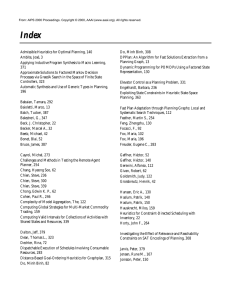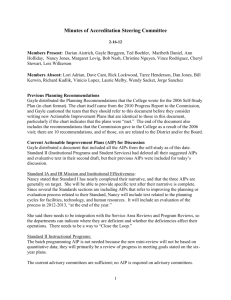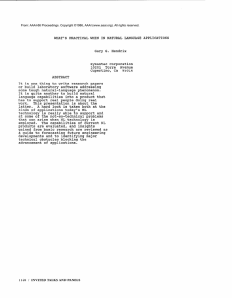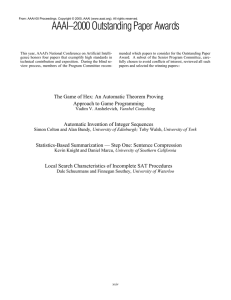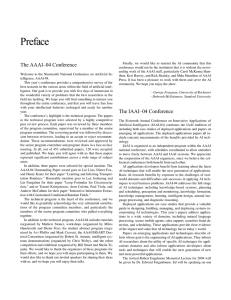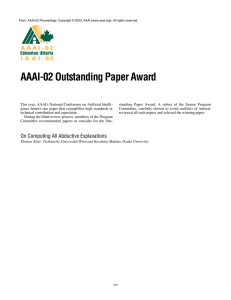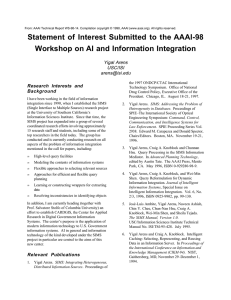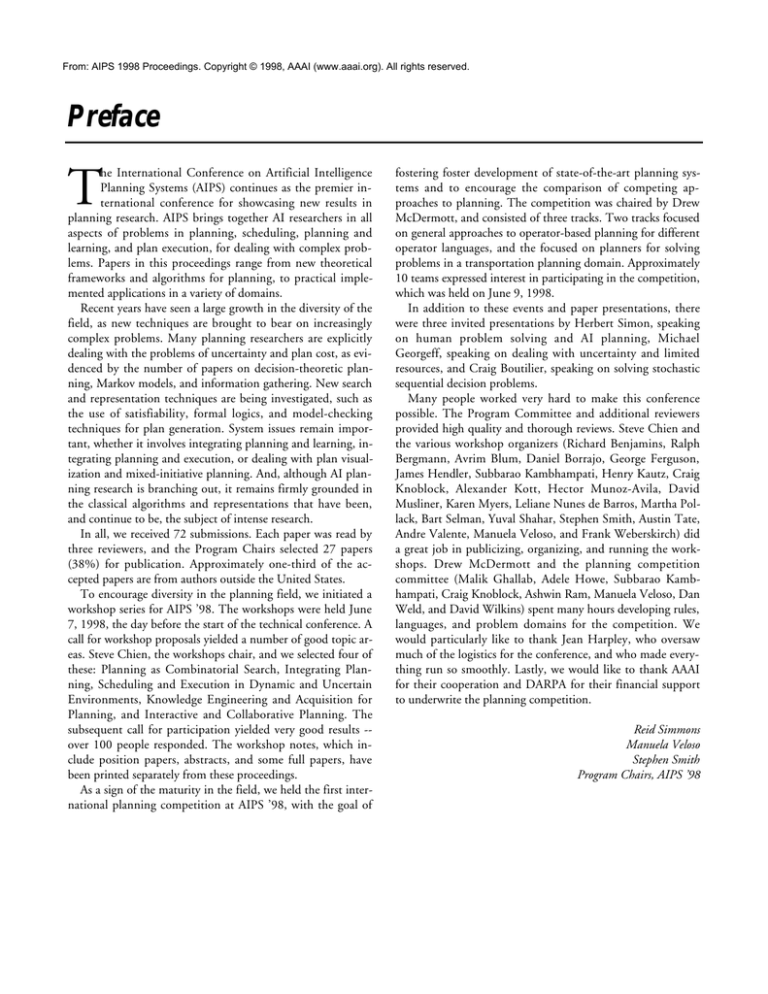
From: AIPS 1998 Proceedings. Copyright © 1998, AAAI (www.aaai.org). All rights reserved.
Preface
T
he International Conference on Artificial Intelligence
Planning Systems (AIPS) continues as the premier international conference for showcasing new results in
planning research. AIPS brings together AI researchers in all
aspects of problems in planning, scheduling, planning and
learning, and plan execution, for dealing with complex problems. Papers in this proceedings range from new theoretical
frameworks and algorithms for planning, to practical implemented applications in a variety of domains.
Recent years have seen a large growth in the diversity of the
field, as new techniques are brought to bear on increasingly
complex problems. Many planning researchers are explicitly
dealing with the problems of uncertainty and plan cost, as evidenced by the number of papers on decision-theoretic planning, Markov models, and information gathering. New search
and representation techniques are being investigated, such as
the use of satisfiability, formal logics, and model-checking
techniques for plan generation. System issues remain important, whether it involves integrating planning and learning, integrating planning and execution, or dealing with plan visualization and mixed-initiative planning. And, although AI planning research is branching out, it remains firmly grounded in
the classical algorithms and representations that have been,
and continue to be, the subject of intense research.
In all, we received 72 submissions. Each paper was read by
three reviewers, and the Program Chairs selected 27 papers
(38%) for publication. Approximately one-third of the accepted papers are from authors outside the United States.
To encourage diversity in the planning field, we initiated a
workshop series for AIPS ’98. The workshops were held June
7, 1998, the day before the start of the technical conference. A
call for workshop proposals yielded a number of good topic areas. Steve Chien, the workshops chair, and we selected four of
these: Planning as Combinatorial Search, Integrating Planning, Scheduling and Execution in Dynamic and Uncertain
Environments, Knowledge Engineering and Acquisition for
Planning, and Interactive and Collaborative Planning. The
subsequent call for participation yielded very good results -over 100 people responded. The workshop notes, which include position papers, abstracts, and some full papers, have
been printed separately from these proceedings.
As a sign of the maturity in the field, we held the first international planning competition at AIPS ’98, with the goal of
fostering foster development of state-of-the-art planning systems and to encourage the comparison of competing approaches to planning. The competition was chaired by Drew
McDermott, and consisted of three tracks. Two tracks focused
on general approaches to operator-based planning for different
operator languages, and the focused on planners for solving
problems in a transportation planning domain. Approximately
10 teams expressed interest in participating in the competition,
which was held on June 9, 1998.
In addition to these events and paper presentations, there
were three invited presentations by Herbert Simon, speaking
on human problem solving and AI planning, Michael
Georgeff, speaking on dealing with uncertainty and limited
resources, and Craig Boutilier, speaking on solving stochastic
sequential decision problems.
Many people worked very hard to make this conference
possible. The Program Committee and additional reviewers
provided high quality and thorough reviews. Steve Chien and
the various workshop organizers (Richard Benjamins, Ralph
Bergmann, Avrim Blum, Daniel Borrajo, George Ferguson,
James Hendler, Subbarao Kambhampati, Henry Kautz, Craig
Knoblock, Alexander Kott, Hector Munoz-Avila, David
Musliner, Karen Myers, Leliane Nunes de Barros, Martha Pollack, Bart Selman, Yuval Shahar, Stephen Smith, Austin Tate,
Andre Valente, Manuela Veloso, and Frank Weberskirch) did
a great job in publicizing, organizing, and running the workshops. Drew McDermott and the planning competition
committee (Malik Ghallab, Adele Howe, Subbarao Kambhampati, Craig Knoblock, Ashwin Ram, Manuela Veloso, Dan
Weld, and David Wilkins) spent many hours developing rules,
languages, and problem domains for the competition. We
would particularly like to thank Jean Harpley, who oversaw
much of the logistics for the conference, and who made everything run so smoothly. Lastly, we would like to thank AAAI
for their cooperation and DARPA for their financial support
to underwrite the planning competition.
Reid Simmons
Manuela Veloso
Stephen Smith
Program Chairs, AIPS ’98

